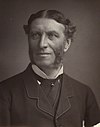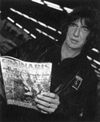| Image
|
Name
|
Join date
|
Known as
|
Known for
|
Refs
|
|
Sir Edward Dyer
|
(1561)
|
Courtier and Poet Chancellor of the Order of the Garter MP for Somerset 1589-
|
a candidate in the Shakespearean authorship question (Alden Brooks 1943)
|
[11]
|

|
Robert Southey
|
1792 DNG
|
Romantic Poet Poet Laureate
|
Goldilocks and the Three Bears After Blenheim
But what good came of it at last?
Quoth little Peterkin.
Why that I cannot tell," said he,
But 'twas a famous victory.
|
[12]
|
 |
Arthur Hugh Clough
|
1836
|
secretarial assistant to Florence Nightingale
|
his sister and daughter both became principals of Newnham College, Cambridge The Bothie of Toper-na-fuosich
|
[1]: 2
|
 |
John Campbell Shairp
|
1839
|
pastoral poet Professor of Humanity, St Andrews Oxford Professor of Poetry
|
"The Poetic Interpretation of Nature" 1877
|
[1]: 3
|
 |
Matthew Arnold
|
1840
|
cultural critic
sage writerOxford Professor of Poetry school inspector
|
The Scholar Gipsy Dover Beach
|
[1]: 3
|
 |
Francis Turner Palgrave
|
1842
|
anthologist Oxford Professor or Poetry
|
Golden Treasury
|
[1]: 4
|
 |
Charles Stuart Calverley (born Blayds)
|
1849 (expelled 1850)
|
Fellow, Christ's Cambridge humourist
|
"Ode to Tobacco" (1862) is on a bronze plaque in Cambridge market square
|
[1]: 6
|
 |
Algernon Charles Swinburne
|
1855 (rusticated 1859)
|
poet-novelist-critic masochist
|
nominated for the Nobel Prize in Literature every year from 1903 to 1909 Poems and Ballads
|
[1]: 18
|
| 100px]]
|
Gerard Manley Hopkins
|
1863
|
Jesuit priest professor of Classics UCD 1884 sprung rhythm
|
though publishing little while alive, has experienced posthumous fame that placed him among leading English poets with his prosody establishing him as an innovator, as did his praise of God through vivid use of imagery and nature; by 1930 Hopkins's work was seen as one of the most original literary advances of his century The Wreck of the Deutschland "the most original poet of the Victorian age" (Ricks 1991)
|
[1]: 38
|
 |
Andrew Lang
|
1864
|
FBA, polymath poet, novelist, literary critic, anthropologist, folklorist
|
Myth, Ritual and Religion (1887) Lang's Fairy Books 1889 -
|
[1]: 44
|
 |
Robert Browning |
1867 |
Poet and playwright |
"the most considerable poet in English since the major Romantics" (Harold Bloom 2004), was a personal friend of the Master Benjamin Jowett and became the college's first Honorary Fellow, donating his portrait and other memorabilia to the college, which grew to become "one of the most distinguished collections of Browning material" |
[13]
|
 |
Andrew Cecil Bradley
|
1869
|
Shakespeare scholar Oxford Professor of Poetry
|
"Shakespearean Tragedy" 1904, probably the most influential single work of Shakespearean criticism ever published [14]
I dreamt last night that Shakespeare’s Ghost
Sat for a civil service post.
The English paper for that year
Had several questions on King Lear
Which Shakespeare answered very badly
Because he hadn’t read his Bradley.
|
[1]: 60
|
|
William Money Hardinge
|
1872
|
The 'Balliol Bugger'
|
gay literature "Clifford Gray: A Romance of Modern Life" 1881
|
[1]: 76
|
 |
Henry Charles Beeching
|
1878
|
Professor of Pastoral Theology KCL 1900-03 Dean of Norwich
|
"A paradise of English Poetry" 1893 "The Masque of B-ll—l" 1880
First come I; my name is Jowett.
There's no knowledge but I know it.
I am master of this college:
What I don't know isn't knowledge.
|
[15]
|
 |
Count Eric Stenbock
|
1879 DNG
|
Baltic Swedish poet writing in English
|
Macabre fiction and poetry "The Song of the Unwept Tear" covered by Marc Almond in Feasting with Panthers Studies of death : romantic tales 1894
|
[16]
|

|
Hilaire Belloc
|
1892
|
Liberal MP for Salford South 1906-10 Catholic literary revival
|
"Cautionary Tales for Children"
The nicest child I ever knew
Was Charles Augustus Fortescue.
He never lost his cap, or tore
His stockings or his pinafore:
Balliol made me, Balliol fed me,
Whatever I had she gave me again;
And the best of Balliol loved and led me,
God be with you, Balliol men
|
[2]: 35
|
|
Walter Lyon
|
1905
|
WW1 war poet
|
"Easter at Ypres" "I Tracked a Dead Man Down a Trench"
|
[2]: 104
|
 |
Julian Grenfell
|
1906
|
WW1 war poet Biography 1976 by Nicholas Mosley (Balliol 1946)
|
DSO "Into Battle" 1915
The thundering line of battle stands,
And in the air Death moans and sings;
But Day shall clasp him with strong hands,
And Night shall fold him in soft wings.
|
[2]: 111
|
|
Patrick Shaw-Stewart
|
1906
|
WW1 war poet
|
"Achilles in the Trench"
I saw a man this morning
Who did not wish to die;
I ask, and cannot answer,
if otherwise wish I.
|
[2]: 115
|
|
Joseph Macleod |
1926 |
British poet, actor, playwright theatre director, theatre historian and BBC newsreader |
One of the earliest interpreters of Chekhov in the UK, whom Basil Bunting claimed was the most important living British poet, while also gaining admiration from Ezra Pound
Riddle-me-ree 1971
"I was afraid and they gave me guts.
I was alone and they made me love.
Round that wild heat they built a furnace
and in the torment smelted me.
Out of my fragments came design:
I was assembled. I moved, I worked,
I grew receptive. Thanks to them
I have fashioned me.
Who am I?"
|
[7]: 26
|
|
Sir Laurence Whistler
|
1930
|
poet and glass engraver
|
President of the British Guild of Glass Engravers King's Gold Medal for Poetry
|
[7]: 72
|
|
F. T. Prince
|
1931
|
WW2 poet
|
One of the best-known poems of the Second World War "Soldiers Bathing"
|
[7]: 79
|
|
Sir Christopher Ricks
|
1953
|
FBA
literary criticProfessor of the Humanities at Boston University.
Formerly Professor at Cambridge
|
practical criticism
"exactly the kind of critic every poet dreams of finding" W H Auden
|
[7]: 272
|
|
Gwyneth Lewis |
1985 |
National Poet of Wales Artist in Residence, Balliol College |
Honorary Fellow, Harkness Fellow wrote the bilingual six-foot-high words on the front of the Wales Millennium Centre |
[17]
|




































